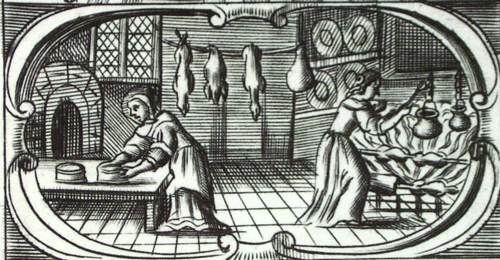Preparing food
Some recipes:
On the left a woman prepares pastry*; in the centre hang poultry or game for roasting* or boiling*; on the right, meat sizzles on the spit, as the woman adds herbs to the pottage.
During Lent, meat was only eaten on Sunday -- a feast day -- so cooks in wealthier homes became ingenious in their recipes. One cookery book of the period describes how to roast a pound of butter,* another warns that, though they may look decorative, peacocks are unattractive eating*.
All recipes are taken from Gervase Markham, The English Housewife (1615).
A compilation of Medieval recipes from period sources, with modern adaptations.
Footnotes
-
To make an excellent veal pie
Take sweet herbs as violet leaves, strawberry leaves, spinach, succory, endive, thyme and sorrel, and chop them as small as may be, and if there be a scallion or two amongst them it will give the better taste; then take the yolks of hard eggs with currants, cinnamon, cloves and mace, and chop them amongst the herbs also; then having cut out long olives [slices] of a leg of veal, roll up more than three parts of the herbs so mixed within the olives, together with a good deal of sweet butter; then having raised your crust of the finest and best paste, strew in the bottom the remainder of the herbs, with a few great raisins having the stones picked out; then put in the olives and cover them with great raisins and a few prunes; then over all lay good store of butter and so bake them; then being sufficiently baked, take claret wine, sugar, cinnamon, and two or three spoonful of wine vinegar and boil them together, and then drawing the pie [from the oven], at a vent in the top of the lid put in the same, and then set it into the oven again a little space, and so serve it forth.
-
Of roast meats
The housewife must know the temperatures of fires for every meat, and which must have a slow fire, yet a good one, taking leisure in roasting, as joints of beef, swans, turkeys, peacocks, bustards, and generally any great large fowl, or any other joints of mutton, veal, pork, kid, lamb, or such like; and which would have a quick and sharp fire without scorching, as pigs, pullets, pheasants, partridge, quail, and all sorts of middle sized or lesser fowl, and all small birds, or compound roast meats, as veal, haslets [giblets], a pound of butter roasted, or puddings simple of themselves; and many other such like, which indeed would be suddenly and quickly despatched, because it is intended in cookery that one of these dishes must be made ready whilst the other is in eating.
-
To boil a mallard
To boil a mallard curiously, take the mallard when it is fair dressed, washed and trussed, and put it on a spit and roast it till you can get the gravy out of it; then take it from the spit and boil it, then take the best of the broth into a pipkin [pot], and the gravy which you saved, with a piece of sweet butter and currants, vinegar, sugar, pepper and grated bread: thus boil all these together, and when the mallard is boiled sufficiently, lay it on a dish with sippets, and the broth upon it, and so serve it forth.
- Curiously
- In an unusual or decorative fashion.
- Sippets
- Slices of toasted bread. Potatoes had only recently been introduced to England, and rice was rarely used.
-
To roast a pound of butter curiously and well
Take a pound of sweet butter and beat it stiff with sugar, and the yolks of eggs; then clap it roundwise about a spit, and lay it before a soft fire, and presently dredge it with bread crumbs; then as it warmeth or melteth, so apply it with dredging till the butter be overcomed and no more will melt to fall from it, then roast it brown, and so draw it [from the spit], and serve it out, the dish being as neatly trimmed with sugar as may be.
-
Of peacocks
The flesh is neither good, delicate nor wholesome, but only a bird for state and show. . . being a bird that delighteth to eat newts, toads, frogs, adders and snakes, whence it comes that he is called the scavenger of the husbandman's yards; and more than his beauty to look upon, and the ornament of his feathers for sundry purpose, I hardly know any other virtue in him.
